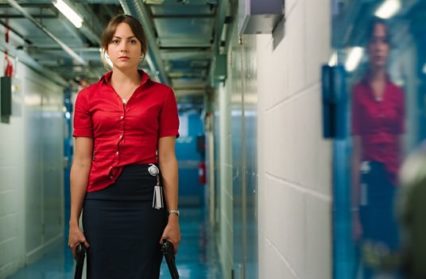Fans of both libraries and revenge thrillers will find something enticing in Y Llyfrgell: The Library Suicides, reviewed by Emma Schofield.
Many of us will be regular library visitors, some will even be familiar with the National Library for Wales which forms the backdrop for Welsh language production, Y Llyfrgell: The Library Suicides, but few will have ever considered the library to be the site of the drama that unfolds throughout this gripping thriller. Attempted murder in the archives, a stealthy chase through the gift shop and even the use of moving shelves as a weapon may very well change your perspective of libraries. The story opens with the lives of Ana and Nan (both played by Catrin Stewart), archivists at the National Library, who live with their mother, a successful Welsh-language author. As the film opens Ana and Nan return home from work to find their mother dying on the pavement outside their home, having apparently committed suicide by jumping from the window above. As the twins struggle to hear their mother’s dying words, she utters the phrase ‘it was Eben’, words which spark a complex revenge plot as the twins set out to avenge their mother by killing the man they believe to be responsible for her death.
Written by Fflur Dafydd and directed by Euros Lyn, the film is inspired by Dafydd’s bestseller, Y Llyfrgell, the script has the natural, flowing feel readers of Dafydd will recognise from her fiction work. The film script is an adaptation of the story, however, so audiences familiar with the fictional tale may want to approach the film with a clear mind as there are some notable differences in the way the two plots unfold. Care has clearly been taken with the development of the script and dialogue is used sparingly between the twins, whose ability to communicate effortlessly with each other is nicely contrasted by Ryland Teifi’s depiction of awkward biographer, Eben.
The action takes place in the very heart of the National Library, with this majestic building seemingly watching on as the characters wreak their havoc. Beautifully shot, the film retains a strong sense of affection for the Library with each scene capturing a different perspective and taking us behind the scenes into parts of the Library we would never normally be permitted to experience. Speaking in a question and answer session after the screening which I attended, director Euros Lyn was keen to acknowledge how fortunate the crew were to have been given such open access to the National Library. In the discussion both Lyn and Dafydd were also at pains to emphasise the centrality of the National Library in the past and future of Wales, noting that libraries have an important role to play in the post-Brexit discussion of culture, history and how we define ourselves. Which begs the question: would this film have worked if it had a different setting? The plot is certainly strong enough that it could have been told in a different setting, but it is the coming together between this tale of personal grief and the almost mystical setting of the National Library that really draws the whole production together and makes it stand out. There are echoes here of the Scandinavian-style drama that has become so popular with audiences in recent years, but with a distinctly Welsh overtone.
Lyn’s patience as a director is also a key part of the film’s success. The opening scenes are not rushed and allow us to become immersed in the life of the twins, to be drawn into their routine and the strange life they share with their mother. Likewise, as the action builds and the twins’ plot gets underway the tempo of the film increases gradually, with the drama mounting at a steady pace which leaves you with an uneasy sense of tension as the film reaches its closing stages. There are enough plot twists to keep audiences guessing until the final scene, but not so many that the film ever becomes farcical. As with all good thrillers, things go wrong, plans are thwarted and doubts creep in, but these features add to the authenticity of the film.
It’s not all drama and intrigue, however. Dylan Dwyfor puts on an excellent performance as security guard Dan, bringing moments of light relief and romance to the film, which provides a good counter-point to some of the more sinister scenes. Dwyfor’s role also highlights how exciting it is to see such a vibrant cast bringing the scenes to life in this Welsh-language production which stars both new and familiar faces. In particular, Catrin Stewart is outstanding as twins Ana and Nan, managing to portray their differences, as well as their likenesses, with a brilliant subtlety.
Fans of Dafydd’s writing and Lyn’s previous productions (including work on Happy Valley and Broadchurch), will appreciate the unique combination of intrigue, black humour and location in this stylish mystery that will keep you guessing until the very last moments. Y Llyfrgell is a film that undoubtedly gets audiences thinking, but visitors to the National Library for Wales may never be able to look at it in exactly the same light again.
Y Llyfrgell: The Library Suicides is currently being shown at venues across Wales and will be released on DVD later this year, subtitles are available. Visit the website for more details and to watch a trailer.












